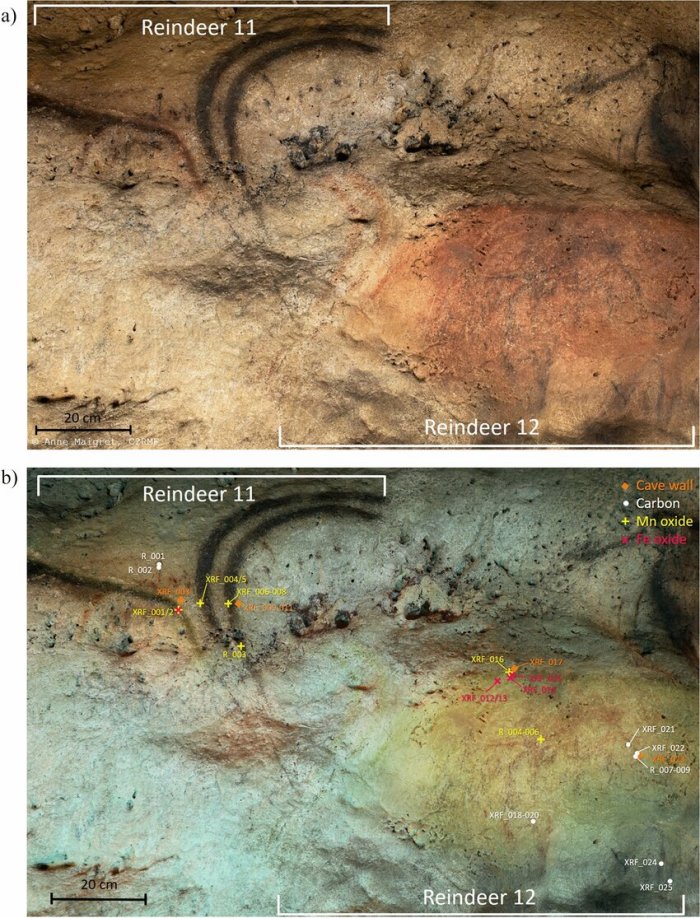Conny Waters - AncientPages.com - On 12 September 1901, Denis Peyrony, a local schoolmaster, stepped inside the Font-De-Gaume Cave. He discovered marvelous prehistoric cave paintings that our ancient ancestors created during the Magdalenian period.
Cro-Magnon artists painting in Font-de-Gaume, by Charles R. Knight from the book the Artist Who Saw Through Time, 1920. Credit: Public Domain
Located in Eyzies-de-Tayac-Sireuil, in the Dordogne region, France, Font-De-Gaume Cave has been on the UNESCO World Heritage List since 1979.
The cave of Font-de-Gaume, with its polychrome decorations, is one of the most beautiful paleolithic sanctuaries. It contains more than 200 painted and engraved animal figures. The cave resembles a 120-meter-long lava passage with three diverging side galleries: the Vidal gallery, the Prat gallery, the side gallery, and a “cabinet des bisons. 1
People have lived in the Dordogne Valley since about 25,000 B.C. More than 200 caves filled with Paleolithic wall drawings, dating from roughly 2.5 million to 12,000 years ago, have been located in France’s Dordogne region. The Dordogne is one of the world’s richest regions in terms of decorated Paleolithic caves, such as the famous Lascaux cave.
Despite countless studies, there is still much to be learned about Paleolithic activities in the Font-De-Gaume Cave. In a paper published in Nature, researchers at the Center de Recherche et de Restauration des Musées de France revealed that the first carbon-based cave art has been found in Dordogne’s famous Bison Cave.
" Using in-situ non-invasive Raman spectroscopy combined with portable X-ray fluorescence analysis as well as visible and infrared imaging of the decor of the Font-de-Gaume cave, we show the presence of a large number of charcoal-based Paleolithic figures besides others made of iron and manganese oxides in the main galleries for the first time.
The creation periods of the cave art at Font-de-Gaume are mainly attributed to the Magdalenian period and probably more complicated constituted of at least two creation phases than commonly established as shown by the direct or partial superimposition of carbon-based and iron- and/or manganese-based figures. Our new results contribute to a better understanding of the organisation of the ornamentation and thus of the imaginary language of our Prehistoric ancestors. The discovery opens new research possibilities for re-reading of the complex panels and absolute radiocarbon dating," the scientists write in their study. 2
First discovery of charcoal-based prehistoric cave art in Dordogne. Sci Rep 13, 22235 (2023). © Anne Maigret.
Before this discovery, "the wall paintings in the Dordogne were dated to around 12,000 to 17,000 years ago, during the Magdalenian Period. With the new discovery, this could be reevaluated to a much more accurate timeline, pushing dates back more than 2,000 years.
New research has been done using visible-light and infrared photography, x-ray fluorescence, and spectroscopy, revealing the carbon-based drawings underneath previously known designs. Charcoal depictions of horses, deer, and bison were discovered.
See also: More Archaeology News
This research will aid comparative research across other sites in the region, and is being heralded as “crucial for archaeological research in the coming years.” 3
Since most of the cave paintings made with iron and manganese oxides cannot be dated through radiocarbon dating technologies, the new findings open a new chapter in the history of ancient cave art. According to the science team, the discovery of C-based cave art is, therefore, not only for the Font-de-Gaume cave but for the whole Dordogne region.
Written by Conny Waters - AncientPages.com Staff Writer
Expand for references- Font-de-Gaume cave - Archéologie Culture France
- Reiche, I., Coquinot, Y., Trosseau, A. et al. First discovery of charcoal-based prehistoric cave art in Dordogne. Sci Rep 13, 22235 (2023). https://doi.org/10.1038/s41598-023-47652-1
- Verity Babbs - The First Carbon-Based Cave Drawings Found in France Prompt a Reevaluation of Paleolithic Art, ArtNet







